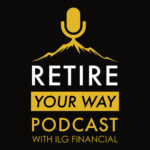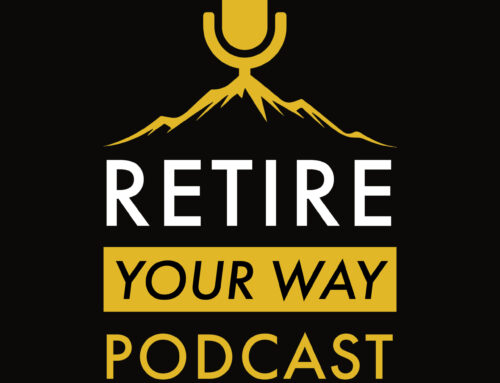Article originally published by Kiplinger.com
Written by Jerry Golden
 “In response to the wild market swings caused by inflation and Russia’s attack on Ukraine, most investment advisers are publishing articles about staying the course during volatile times. I’ve found one problem with these suggestions, particularly when it comes to investors near or in retirement: The advice is focused on your investment allocation, when your own focus most likely will be on your income, now and in the future. You don’t want a small — or worse yet, a large — market correction to wipe out your plans for income along with what you want to spend it on.
“In response to the wild market swings caused by inflation and Russia’s attack on Ukraine, most investment advisers are publishing articles about staying the course during volatile times. I’ve found one problem with these suggestions, particularly when it comes to investors near or in retirement: The advice is focused on your investment allocation, when your own focus most likely will be on your income, now and in the future. You don’t want a small — or worse yet, a large — market correction to wipe out your plans for income along with what you want to spend it on.
So, my question is: How much of your current and future retirement income should be dependent on the stock market — no matter whether it is heading up or down at any given point?
Answer: Design a plan for retirement income and you’ll find your safe harbor.
How to think about market volatility in a plan for retirement income
People like you who are thinking a lot about retirement generally fit into three stages:
- Planning to retire in five to 10 years and wondering about whether and how to reposition your savings during the homestretch.
- About to retire and ready to implement the final pieces of a plan that looked pretty good over the past few years.
- Already retired with a plan that has done well for the past several years — but nervous about the effects of the latest market volatility.
When you put together your own plan for retirement income you want your income to: (a) meet your current needs, (b) grow over time, and (c) last your lifetime. And you may want to leave a specific legacy at your passing. Finally, while often not discussed, you want a plan with a long-term view that will also reduce the anxiety that comes with stomach-churning drops in the market.
In retirement, the No. 1 concern is running out of money, so although you want the potential upside of the market, you also want to avoid big gambles. The result should be a plan that includes stocks, while also relying on income from safe sources to balance out the markets’ rough rides.
A Strategy to Weather Market Crashes
The goal is simple: You don’t want to be forced to change your lifestyle because of a downturn in the market, or even from a large, unexpected expense. Cutting back during retirement feels just like it does when you were employed: rotten. So, here’s our recommended approach to building a plan for retirement income that can weather the storms:
- Create a plan that is built around income. Understand what happens to income when market volatility occurs.
- Make sure that a large percentage of that income is safe and not impacted by market swings.
- Soften the impact of market gyrations by making sure any income that is based on a withdrawal/sale of investment is from a balanced portfolio of stocks and bonds
- Actively manage your plan so that if there is that market correction you are able to make minor adjustments to your planning objectives going forward.”
Click here to read the remainder of this article.






















 Megan Jones joined the ILG Financial team in 2020 as marketing director. Megan and her husband live in Fredericksburg, VA with their German Short Haired Pointer, Gus. Megan is a graduate of Longwood University and holds a degree in communications. Megan is the oldest of Dave Lopez’s three children and not only enjoys working alongside her father, but also with her cousin, Chase, who joined the ILG Financial team in 2020 as an advisor. Megan is also a fully licensed Life, Health, and Annuity agent. When not at work, Megan enjoys sitting on the back porch with family and friends enjoying food and music.
Megan Jones joined the ILG Financial team in 2020 as marketing director. Megan and her husband live in Fredericksburg, VA with their German Short Haired Pointer, Gus. Megan is a graduate of Longwood University and holds a degree in communications. Megan is the oldest of Dave Lopez’s three children and not only enjoys working alongside her father, but also with her cousin, Chase, who joined the ILG Financial team in 2020 as an advisor. Megan is also a fully licensed Life, Health, and Annuity agent. When not at work, Megan enjoys sitting on the back porch with family and friends enjoying food and music. Chase Lopez joined the ILG Financial team in 2020 as an advisor. Chase is a 2016 James Madison University graduate with a degree in management. Chase has been trained under the tutelage of Dave Lopez, who is not only the founder and managing member of ILG Financial, but also is Chase’s uncle and godfather. He also enjoys working alongside his cousin, Megan, who is Dave’s daughter.
Chase Lopez joined the ILG Financial team in 2020 as an advisor. Chase is a 2016 James Madison University graduate with a degree in management. Chase has been trained under the tutelage of Dave Lopez, who is not only the founder and managing member of ILG Financial, but also is Chase’s uncle and godfather. He also enjoys working alongside his cousin, Megan, who is Dave’s daughter. Amy Anderson joined the ILG Financial team in 2023 as the client relations coordinator. Her responsibilities include scheduling of appointments, annual check-up notifications, and annuity and required minimum distribution assistance. She is a graduate of Harding University with a degree in Computer Information Systems. Amy and her husband have two children and she enjoys reading, crocheting, music and spending time with her family.
Amy Anderson joined the ILG Financial team in 2023 as the client relations coordinator. Her responsibilities include scheduling of appointments, annual check-up notifications, and annuity and required minimum distribution assistance. She is a graduate of Harding University with a degree in Computer Information Systems. Amy and her husband have two children and she enjoys reading, crocheting, music and spending time with her family. Jessica Carson joined the ILG Financial team in 2018 as an agent. Jessica and her husband have four children, two dogs, 3 barn cats, 5 chickens, and three parakeets. She indeed loves her children and pets! When not at work, Jessica enjoys playing the piano and cello as well as traveling and spending time outside with her family, hiking, fishing, and boating.
Jessica Carson joined the ILG Financial team in 2018 as an agent. Jessica and her husband have four children, two dogs, 3 barn cats, 5 chickens, and three parakeets. She indeed loves her children and pets! When not at work, Jessica enjoys playing the piano and cello as well as traveling and spending time outside with her family, hiking, fishing, and boating. Terri Center joined the ILG Financial team in 2019 as client services manager. She handles client records, application processing, and gathering information to provide a professional and friendly experience with all of our clients. Terri is a graduate of Oakland University. She is married and has two children. She enjoys hiking, family time, and puzzle challenging video games. She also likes to share her creativity in her canvas paintings and sewing projects.
Terri Center joined the ILG Financial team in 2019 as client services manager. She handles client records, application processing, and gathering information to provide a professional and friendly experience with all of our clients. Terri is a graduate of Oakland University. She is married and has two children. She enjoys hiking, family time, and puzzle challenging video games. She also likes to share her creativity in her canvas paintings and sewing projects.